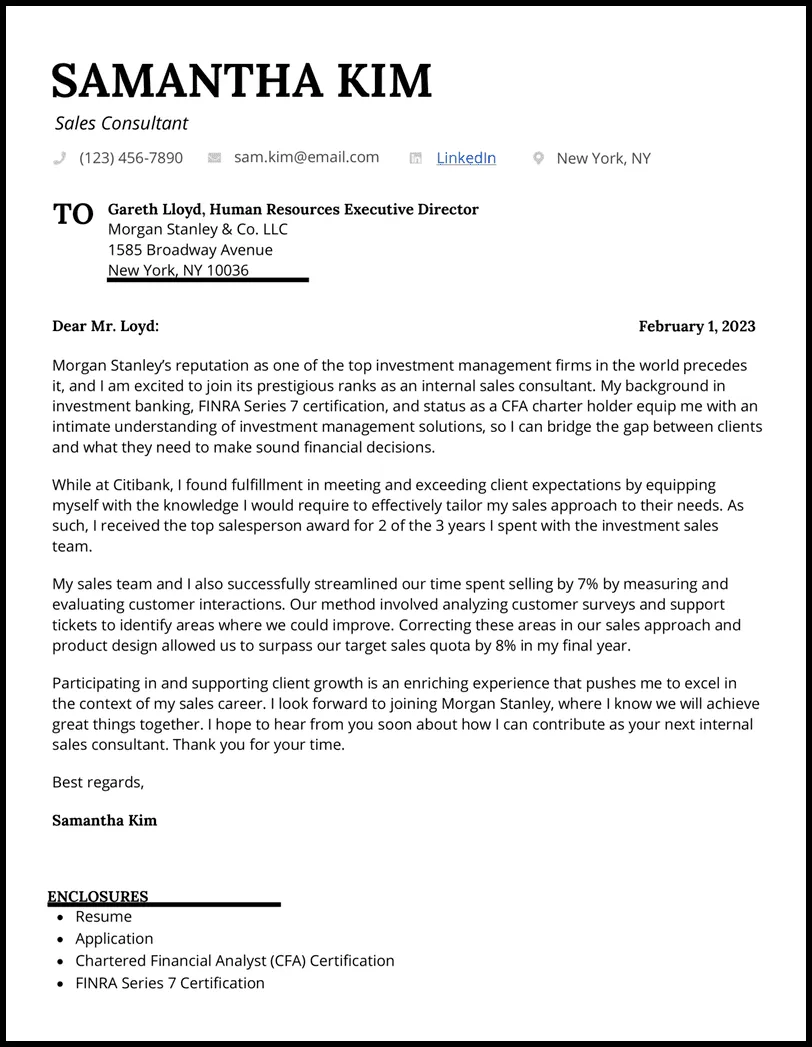Why a Professional Sales Cover Letter Matters
In the competitive world of sales, a professional cover letter is your first opportunity to make a lasting impression. It serves as more than just an introduction; it’s a vital tool that can significantly increase your chances of landing an interview. A well-crafted cover letter allows you to showcase your personality, highlight your achievements, and demonstrate why you’re the perfect fit for the role. Unlike a resume, which provides a snapshot of your experience, a cover letter allows you to tell a compelling story about your career trajectory and your passion for sales. It’s where you can truly sell yourself and capture the attention of potential employers.
Showcasing Your Sales Achievements
Your cover letter is the ideal platform to showcase your sales achievements. Rather than just listing your job responsibilities, focus on quantifiable results that demonstrate your success. This includes specific metrics like revenue generated, sales targets exceeded, customer acquisition rates, and any awards or recognition you’ve received. Use data to illustrate your impact and provide concrete evidence of your capabilities. This helps potential employers quickly understand your value proposition. Think about the key achievements you are most proud of and make sure to integrate those achievements into your cover letter so that they can impress the reader.
Quantify Your Accomplishments
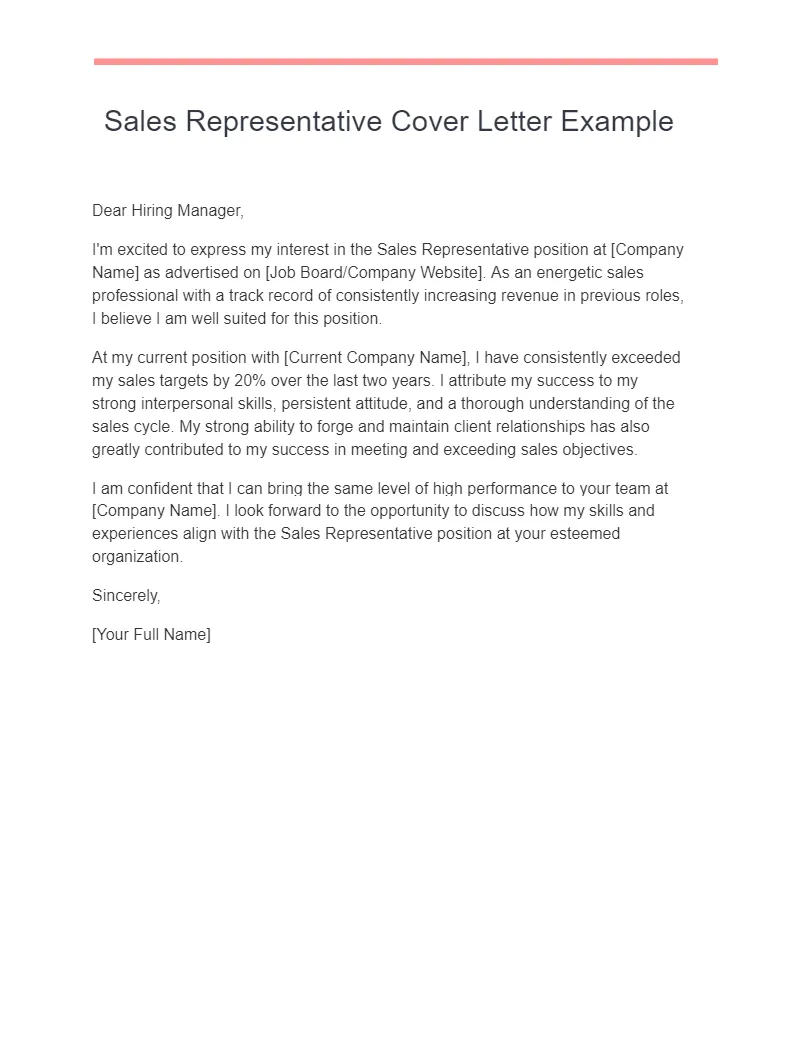
Numbers speak louder than words, especially in sales. When describing your accomplishments, use quantifiable data to provide a clear picture of your performance. For example, instead of saying ‘Increased sales,’ state ‘Increased sales by 25% in Q4.’ Similarly, instead of ‘Acquired new clients,’ write ‘Acquired 50 new clients in six months.’ These specific figures make your accomplishments more credible and memorable. Furthermore, quantify your impact whenever possible to give the hiring manager a solid idea of your capabilities and what value you will bring to the company.
Highlighting Relevant Skills
A successful sales cover letter highlights the skills that are most relevant to the job you’re applying for. Carefully review the job description and identify the key skills the employer is looking for. These might include prospecting, lead generation, negotiation, closing deals, or customer relationship management (CRM). Your cover letter should explicitly mention these skills and provide examples of how you’ve utilized them in your previous roles. This targeted approach demonstrates that you understand the requirements of the position and possess the necessary abilities to excel.
Sales Skills to Emphasize
When writing your sales cover letter, there are certain sales skills to emphasize. These include but are not limited to: the ability to build rapport, active listening, effective communication, negotiation, closing techniques, and product knowledge. Sales professionals must be able to quickly understand their customer’s needs and tailor their approach accordingly. The cover letter is an opportunity to not only list these skills but also provide examples of how they have been applied in real-world situations.
Communication Skills for Sales
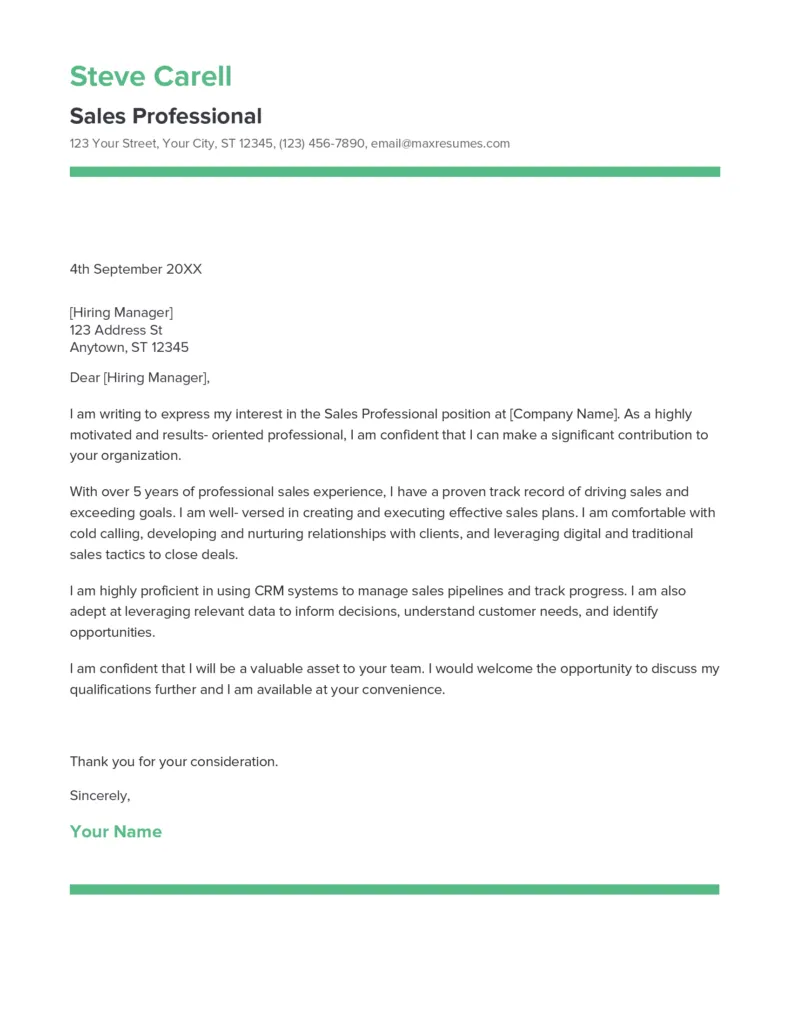
Communication is at the heart of sales, so highlighting your communication skills is crucial. This includes both written and verbal communication. In your cover letter, demonstrate your ability to articulate your ideas clearly and persuasively. Use concise language, avoid jargon, and ensure your letter is free of grammatical errors. When referencing your verbal communication skills, provide examples of how you have successfully presented to clients, negotiated deals, or handled objections. Demonstrating strong communication skills in your cover letter sets a positive tone and shows your professionalism.
Building a Strong Cover Letter Structure
A well-structured cover letter is easy to read and makes a positive first impression. The structure should include a clear header, an engaging opening paragraph, several body paragraphs that highlight your skills and accomplishments, and a compelling closing. Each section of your cover letter plays a critical role in conveying your value and making you stand out from other applicants. Proper formatting and a logical flow of information are also key to ensuring your cover letter is effective.
Header & Contact Information
Your header should include your full name, contact information (phone number and email address), and the date. If you’re applying for a specific position, it’s also a good idea to include the name of the hiring manager and the company’s address. This information ensures that your cover letter looks professional and that the recipient can easily contact you. Make sure the information is accurate and up-to-date to avoid any missed opportunities.
Opening Paragraph that Grabs Attention
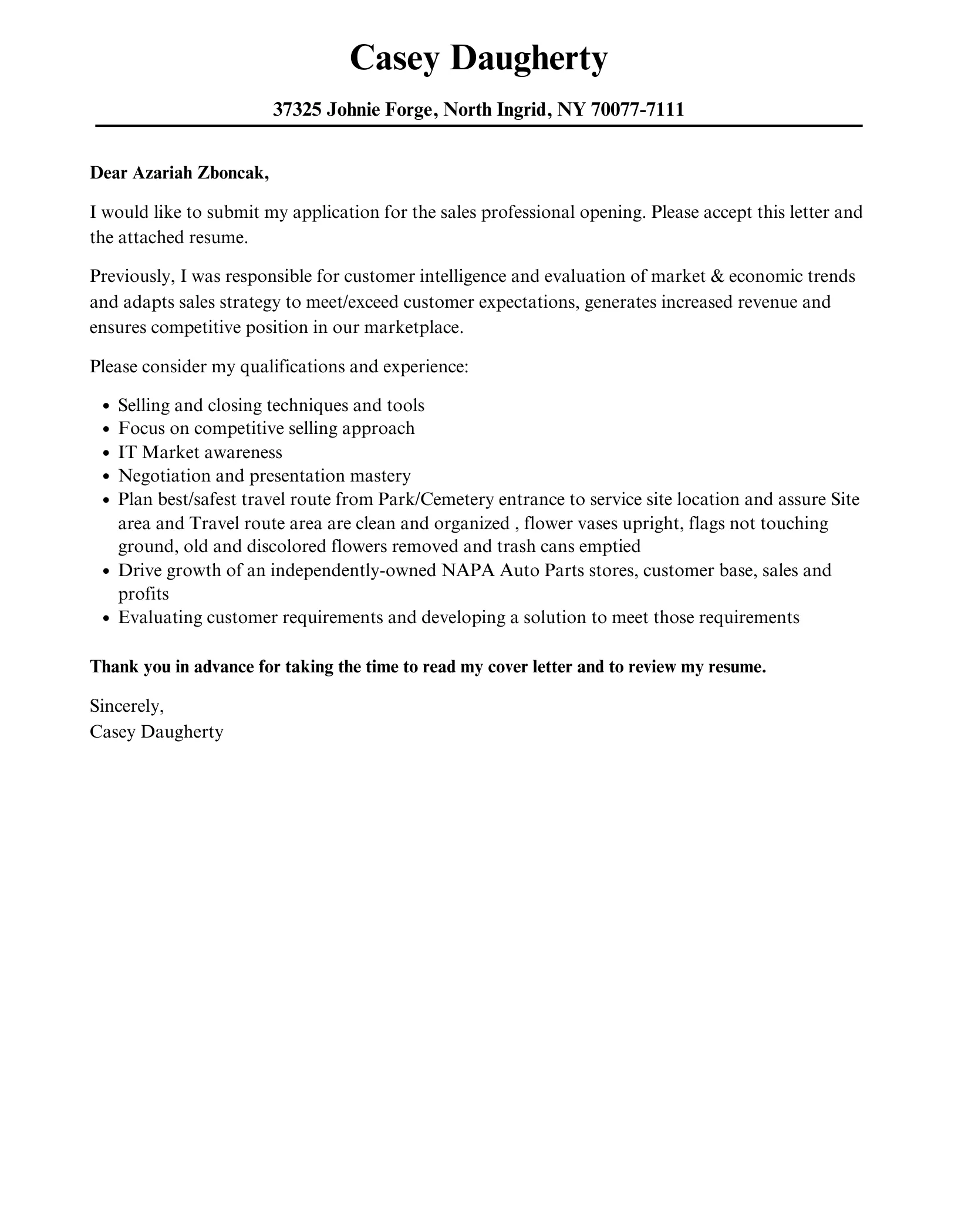
The opening paragraph is your chance to make a strong first impression. Start with a hook that captures the reader’s attention. This could be a specific achievement, a statement of your passion for sales, or a reference to something that caught your eye in the job description. Avoid generic opening lines. Instead, personalize your opening by directly addressing the company’s needs or mentioning a specific project or product that excites you. A great opening paragraph sets the tone for your entire cover letter.
The Body Paragraphs Key Elements
The body paragraphs of your cover letter are where you provide details about your skills, experience, and accomplishments. Each paragraph should focus on a specific aspect of your qualifications. Connect your previous experiences and achievements to the requirements of the job. Give specific examples of how you have successfully used your skills in the past. This section should provide concrete evidence that you can perform well in the role. Use clear, concise language and avoid overwhelming the reader with excessive information.
Highlighting Your Value Proposition
Clearly articulate your value proposition. Explain what you bring to the table and what makes you unique. Focus on how your skills and experience align with the company’s goals. If you have a track record of exceeding sales targets, mention that. If you have experience working with a specific industry or product, highlight that. Make sure that the company knows why you are a great candidate for them. Your value proposition should provide the employer with a clear understanding of why they should choose you for the role.
Tailoring Your Letter to the Role
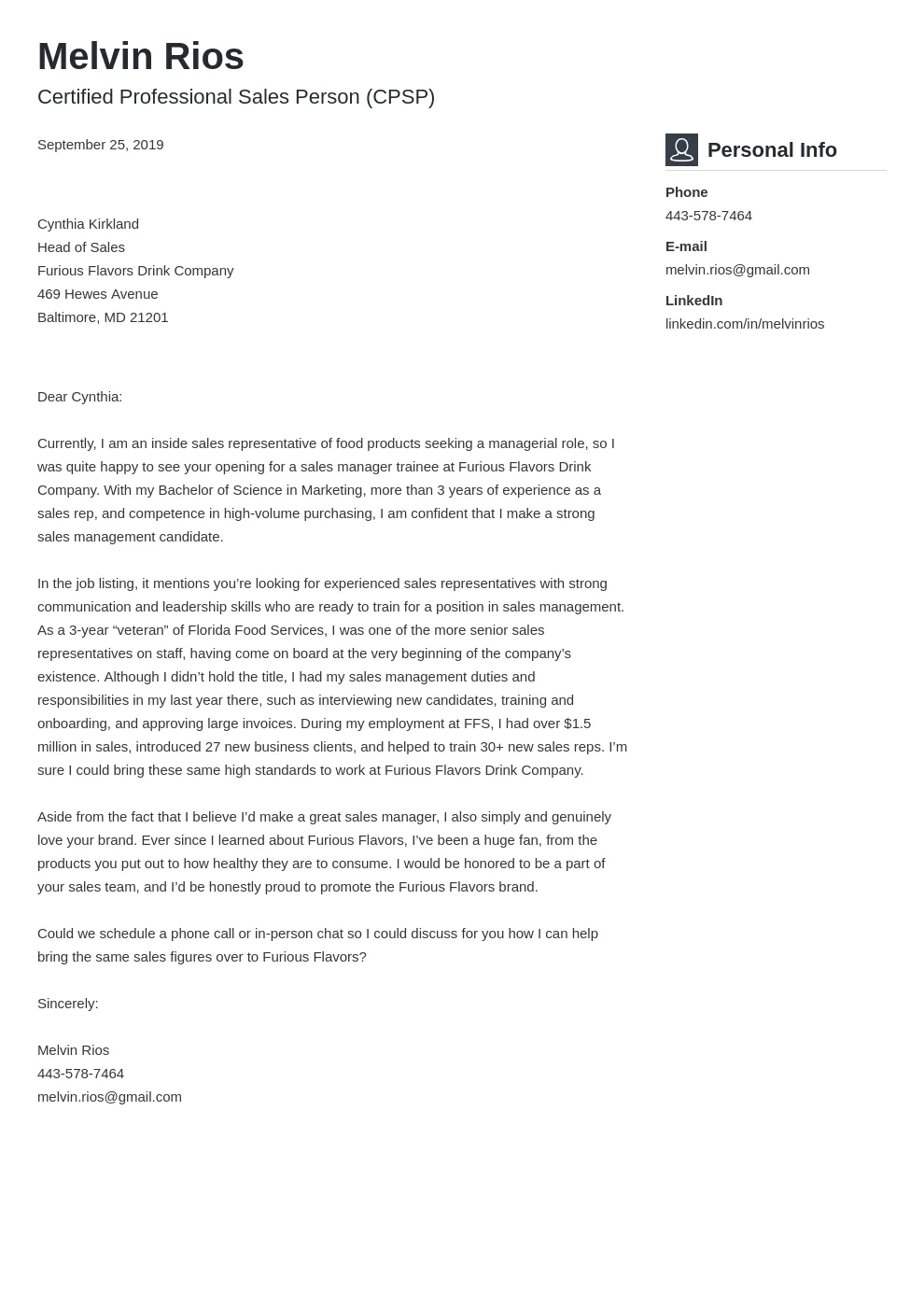
Never send a generic cover letter. Customize each letter to the specific job and company you’re applying to. Research the company and the role to understand their needs and priorities. Use keywords from the job description throughout your letter. Make sure the requirements of the role are fully covered in your cover letter. By demonstrating that you’ve taken the time to understand the company, you show your genuine interest and increase your chances of getting an interview.
Using Action Verbs to Showcase Impact
Use strong action verbs to describe your accomplishments. Action verbs such as ‘achieved,’ ‘managed,’ ‘developed,’ ‘implemented,’ and ‘increased’ bring your achievements to life and create a sense of impact. For instance, instead of writing ‘Responsible for sales,’ write ‘Managed a sales team and increased revenue by 15% in one year.’ Action verbs give your statements more power and make it easier for the reader to understand your contributions.
Writing a Compelling Closing
Your closing should summarize your interest in the position and reiterate your value. Thank the hiring manager for their time and consideration. End with a clear call to action, such as expressing your enthusiasm for the opportunity to discuss your qualifications further. It’s also appropriate to include your availability for an interview. A well-crafted closing leaves a positive final impression.
Expressing Enthusiasm and Next Steps
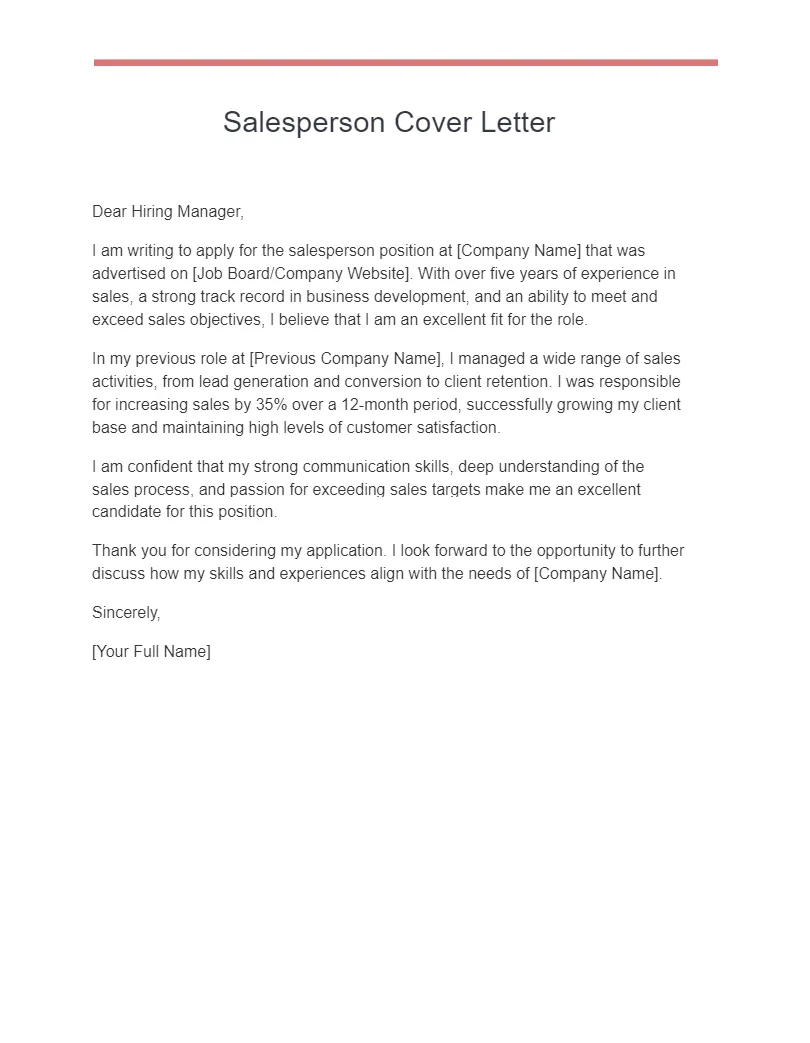
In your closing, express your enthusiasm for the opportunity and state your willingness to take the next steps. Indicate your availability for an interview and thank the hiring manager for considering your application. Reiterate your interest in the company and the role, and emphasize your commitment to contributing to their success. This positive and proactive approach can leave a lasting impression on the reader.
Formatting Your Sales Cover Letter for Success
The appearance of your cover letter is just as important as its content. Proper formatting makes your letter easy to read and helps you make a professional impression. Choose a professional font, maintain consistent spacing, and use clear headings and bullet points to organize your information effectively. Make sure your letter is visually appealing and reflects your attention to detail.
Choosing the Right Font and Style
Select a professional and readable font, such as Times New Roman, Arial, or Calibri. Keep the font size between 10 and 12 points for easy readability. Use consistent formatting throughout the document. Make sure the font is easy to read and does not distract from the content. Your cover letter should look clean, organized, and easy on the eyes.
Proofreading and Editing Tips
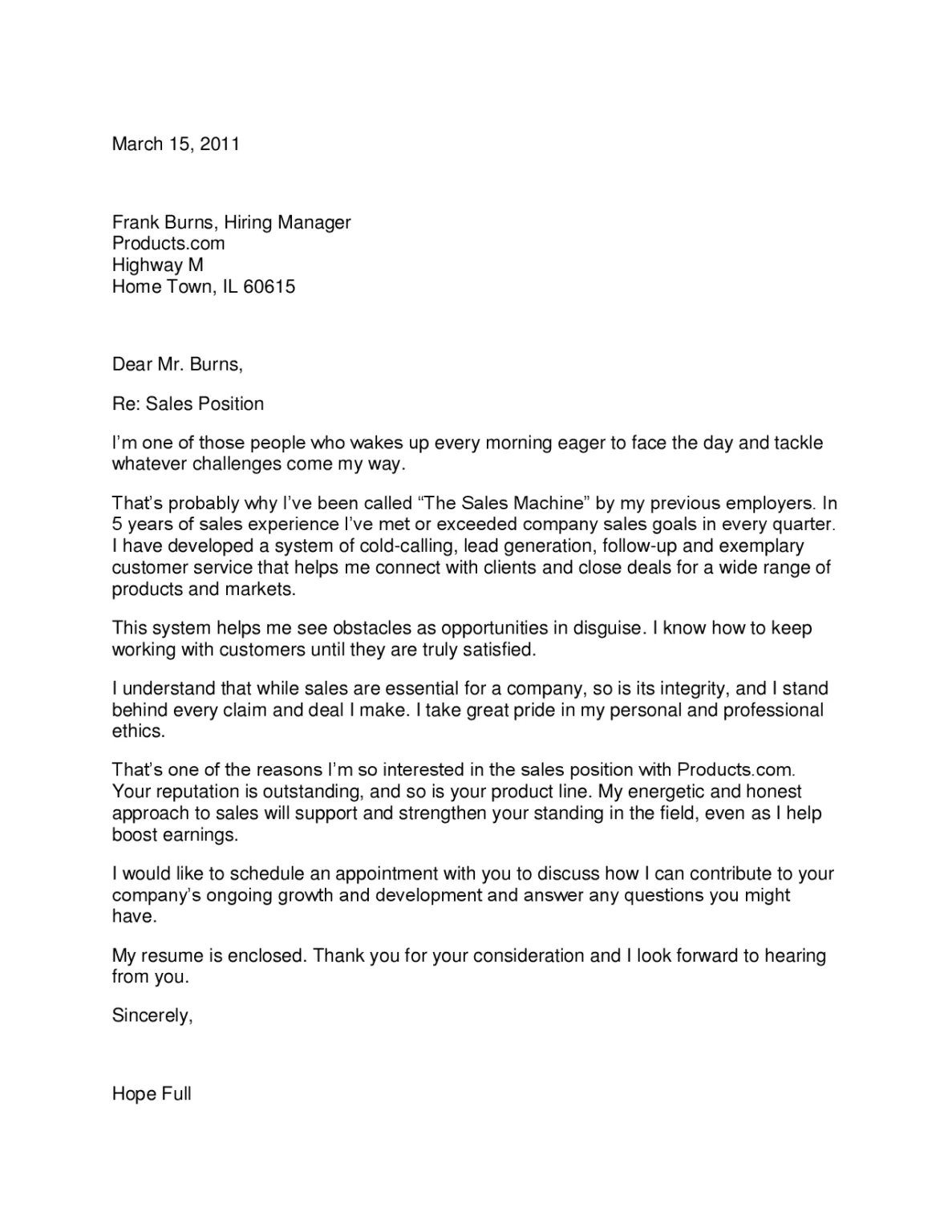
Always proofread your cover letter carefully. Check for any grammatical errors, spelling mistakes, or typos. Even minor errors can detract from your credibility. Read your letter aloud to identify awkward phrasing or unclear sentences. Consider having a friend or career counselor review your cover letter for feedback. A well-edited cover letter demonstrates your attention to detail and commitment to quality.
Avoiding Common Sales Cover Letter Mistakes
Avoiding common mistakes can help you create a winning sales cover letter. Be careful to avoid generic content, failing to tailor your letter to the specific role, or ignoring the job description. It’s also important to refrain from using overly casual language or including irrelevant information. Make sure your cover letter is concise, professional, and focused on what you can offer to the employer.
Generic vs Tailored Approach
Avoid the trap of sending a generic cover letter. A generic approach is one of the most common mistakes. Tailor your cover letter to each job and company. Show your interest and that you took the time to research their company. Generic cover letters that are not tailored to the specific opportunity are not as effective. Companies appreciate candidates who show a genuine interest in their organization.
Ignoring the Job Description
Ignoring the job description is another major mistake. Carefully read the job description and address all the requirements and skills in your cover letter. Failure to do so can make it appear that you are not a good fit for the role. Tailoring your cover letter to the job description is essential. Matching your skills and experience with the requirements of the role demonstrates that you are the right candidate for the job.
Not Proofreading Before Sending
Failing to proofread your cover letter is a significant error. Errors can make you look unprofessional and demonstrate a lack of attention to detail. Always proofread your cover letter before sending it. Check for grammar, spelling, punctuation, and typos. It is highly recommended that you get a second opinion from someone you trust to review your cover letter.
Sales Cover Letter Examples to Inspire You
Reviewing sales cover letter examples can provide inspiration and guidance. Look for examples that align with the specific type of sales role you are targeting. Pay attention to the formatting, language, and the way the candidates highlight their skills and achievements. Adapt these examples to your own situation. Use examples to get insights to structure your sales cover letter so that it can impress the hiring manager.
Example Sales Cover Letter
Here’s an example of a sales cover letter for your inspiration:
[Your Name] [Your Address] [Your Phone Number] [Your Email]
[Date]
[Hiring Manager Name] [Company Name] [Company Address]
Dear [Mr./Ms./Mx. Hiring Manager Last Name],
I am writing to express my keen interest in the Sales Representative position at [Company Name], as advertised on [Platform]. With a proven track record of exceeding sales targets and building strong client relationships, I am confident that I can make a significant contribution to your team.
In my previous role at [Previous Company], I consistently exceeded sales quotas by an average of 20% per quarter. I accomplished this by developing and implementing effective sales strategies, identifying new business opportunities, and providing exceptional customer service. I am highly proficient in prospecting, lead generation, and closing deals, and I have a deep understanding of [relevant industry or product].
I am particularly drawn to [Company Name]’s commitment to [mention something specific about the company that interests you]. I am eager to leverage my skills and experience to contribute to your continued success.
Thank you for your time and consideration. I look forward to the opportunity to discuss my qualifications further. I am available for an interview at your earliest convenience.
Sincerely, [Your Name]
Sales Cover Letter for Entry-Level Positions
For entry-level sales positions, focus on highlighting transferable skills, such as communication, problem-solving, and customer service. Emphasize any relevant coursework, internships, or volunteer experiences that demonstrate your enthusiasm for sales. Show your eagerness to learn and grow in a sales environment. Highlight any awards or recognitions you’ve received, even if they are unrelated to sales, to showcase your overall dedication. Express your willingness to be trained, and your eagerness to contribute to the company’s sales goals.
Sales Cover Letter for Experienced Professionals
Experienced sales professionals should focus on quantifying their accomplishments and showcasing their track record of success. Provide specific examples of how you’ve driven revenue growth, exceeded sales targets, and built strong client relationships. Highlight your experience with different sales methodologies, CRM systems, and industry-specific knowledge. Show your ability to lead and mentor sales teams. When you are an experienced sales professional your past experience is the most important part of your cover letter, use the opportunity to highlight the specific things you accomplished.
